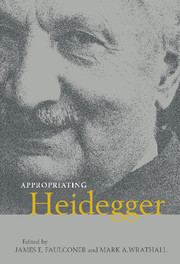Book contents
- Frontmatter
- Contents
- List of contributors
- Acknowledgments
- 1 Appropriating Heidegger
- PART 1 THINKING OUR AGE
- PART 2 HEIDEGGER IN CONTEXT
- 6 People of God, people of being: the theological presuppositions of Heidegger's path of thought
- 7 Heidegger for beginners
- 8 The critique of anthropologism in Heidegger's thought
- PART 3 READING BEING AND TIME
- Index
6 - People of God, people of being: the theological presuppositions of Heidegger's path of thought
Published online by Cambridge University Press: 22 September 2009
- Frontmatter
- Contents
- List of contributors
- Acknowledgments
- 1 Appropriating Heidegger
- PART 1 THINKING OUR AGE
- PART 2 HEIDEGGER IN CONTEXT
- 6 People of God, people of being: the theological presuppositions of Heidegger's path of thought
- 7 Heidegger for beginners
- 8 The critique of anthropologism in Heidegger's thought
- PART 3 READING BEING AND TIME
- Index
Summary
Theology has found it a very agreeable business to appropriate Heidegger, not least because a great deal of what Heidegger has to say arises from a genuine proximity to theology, a certain appropriation of theology that Heidegger has all along been making. When theology looks deeply enough into Heidegger's well, it often finds its own face looking back. For his thought, both early and late, is marked throughout by a transparent theological analogy. These unmistakable theological presuppositions constitute what Heidegger himself would call das im Sagen Ungesagte, what is unsaid and unthought in what someone says and thinks, the exposition of which constitutes a genuine interpretation (Auslegung) of a thinker. As someone whose work has always been situated in the distance between theology and philosophy, my first interests lay in exploring the intersection of Heidegger with religious mysticism and Heidegger's own beginnings in medieval philosophy and mysticism. With time, I grew more suspicious of Heidegger and in 1993 I made my concerns public under the banner of what I called “demythologizing” Heidegger. I continue that project of demythologizing here, with an eye to the mutual interaction of theology and Heidegger.
THE EARLY CHRISTIAN DAWN, THE EARLY GREEK DAWN
The much celebrated “path of thought” (Denkweg) was first set in motion in the first Freiburg period (1919–23) by the project of a “hermeneutics of factical life,” which was an attempt to find a new conceptuality in which to “indicate,” however “formally,” the character of pretheoretical, prephilosophical, indeed even preconceptual life.
- Type
- Chapter
- Information
- Appropriating Heidegger , pp. 85 - 100Publisher: Cambridge University PressPrint publication year: 2000
- 6
- Cited by

